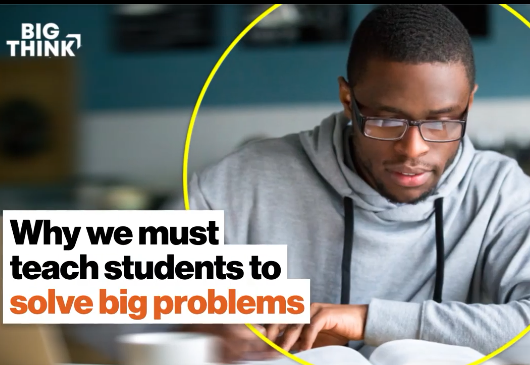This idea of 'What do you want to be when you grow up?'
“你长大后想做什么?”这个问题
I've heard people ask my five-year-old. That question made sense when I was a kid.
我听到有人问我五岁的孩子这个问题。在我小时候,这个问题还能说得通。
It doesn't make sense; jobs are shifting and changing.
但现在说不同了;工作在不断变化。
Look what's happening with jobs today.
看看今天的工作都发生了什么改变。
This whole push on automation, robotics and artificial intelligence is going to re-create or redo jobs completely.
这种对自动化、机器人和人工智能的推动将彻底重新创造或重做工作。
We see that coming, so the question that I ask students and again, every time I talk to students, I ask them 'What problem do you want to solve.
我们预见到这一点,所以每次我和学生交谈时,我都会问他们‘你们想解决什么问题?
What's the problem that spins in your head?'
你脑子里在想的是什么问题?”
And it doesn't have to be a social problem, like social entrepreneurship as you mentioned.
不一定非得是个社会问题,比如你提到的社会企业家精神。
It could be how to make cars go faster.
它可以是如何让汽车跑得更快。
It could be anything. If you watch Shark Tank every person who walks into that tank is solving a problem.
可以是任何问题。如果你看《创智赢家》,每个走进这个团体的人都在解决一个问题。

Sometimes they're solving problems you didn't know you had.
有时他们解决的是你不知道自己存在的问题。
So they're problem solving. What is the problem that you want to solve? So that's part one.
所以他们在解决问题。你想解决什么问题?这是第一部分。
If you don't know, what a great time to dive deep into that problem that you're interested and passionate about.
如果你不知道,那就是深入研究你感兴趣和有热情的问题的好时机。
How do you assess what's the problem that you're passionate about and interested in?
你对自己所热衷和感兴趣的问题的评价是什么?
The second question is just as important which is: How do you want to solve that problem?
第二个问题同样重要,那就是:你想如何解决这个问题?
And that's an important question because there's a million ways to solve a problem,
这是一个很重要的问题,因为解决一个问题有上百万种方法,
so if you as a student say 'I want to solve climate change',
如果你还是学生,你说‘我想解决气候变化问题’,
an adult, an administrator or a teacher or parent might say 'Oh, climate change. Wait.
那么成年人、管理者,或者是老师或家长可能会说‘哦,气候变化。等等。
You need to study STEM. You need to go study science.
你需要学习理工科。你得学习科学。
You need to get a degree in global sustainable development' or whatever it be.
你需要获得全球可持续发展方面的学位,或者诸如此类的学位。
Yes, there's multiple ways to solve the problem that way.
是的,有多种方法可以解决这个问题。
But what if, during the—understanding how you want to solve the problem, understanding your gifts, your talents, your passions, you realize that you're an amazing photographer.
但是如果,在搞清楚你想要如何解决问题的过程中,你了解了自己的天赋、才能、激情,却发现自己是一个很棒的摄影师。
You just have a way with photographing things and telling stories through pictures.
你很擅长用照片拍摄事物和讲述故事。
Or you're an amazing writer.
或者你发现自己是个很棒的作家。
The way you can solve climate change is by going out and documenting climate change and photographing it or creating educational programs around climate change.
解决气候变化问题的方法是走出去,记录气候变化,拍摄气候变化或者围绕气候变化创建教育项目。
So 'How do you want to solve that problem?' is important.
所以“你想如何解决这个问题?”是很重要的。
And if you don't know there's some more time you can spend doing that.
如果你不知道,那你可以花点时间去搞清楚。
And then the third part of that—and this is where all of this comes in, so it's a great kind of question to put all this together—
然后是第三部分——也就是所有问题的来源,把一切都综合起来是个很好的问题——
which is: What do you need to know to solve that problem?
为了解决这个问题,你得知道些什么?
What are the knowledge, skills and abilities you need to have to solve that problem and how can you start developing those knowledge, skills and abilities in both angles of this:
你需要什么样的知识、技能和能力来解决这个问题,以及你如何在以下两个方面掌握这些知识、技能和能力:
The climate change knowledge, skills and abilities and the photography knowledge, skills and abilities?
气候变化的知识、技能、能力和摄影的知识、技能、能力?
What do you need to know? What information do you need?
你需要知道什么?你需要什么信息?
What lessons are out there? What classes can you take?
有什么经验可供参考?你能上什么课?
What newsletters and blogs and who's solving this problem now in the way that you're trying to solve it?
有哪些时事通讯和博客,以及现在谁在用你解决问题的方式去解决这个问题?
What do they know? How can you reach out to them?
他们知道什么?你如何与他们联系?
How do you track their career? And if you don't know, you can dive deep on that problem.
你如何追踪他们的职业生涯?如果你不知道,你可以深入研究这个问题。
So you know you want to solve climate change and you know you want to do it through photography,
你知道自己想解决气候变化,你也知道你想通过摄影来解决这个问题,
think about the rest of the time now you can spend on figuring out what are the things that you need to know and you need to master to solve that problem and you can be working on those right now.
那么剩下的时间就可以清楚你需要知道和掌握哪些东西去解决这个问题,你可以研究这些事情了。
I think that this is a—with every tragedy, with every crisis there's an opportunity, and I think that's where we find ourselves.
我认为,每一场悲剧、每一场危机都蕴含着机遇,那也是我们发现自我的方式。
I don't think we need to go and re-create education or blow it all up and start all over again.
我觉得我们不需要去重新创造教育,或者把它全部推翻重新开始。
I think if we can build a culture of continuous improvement, a culture of continuous learning, a culture of iteration and innovation
我认为如果我们能建立一种持续改进的文化,一种持续学习的文化,一种迭代和创新的文化,
and we bring that to our schools so that we're constantly trying to make things better.
并把它带到学校,这样我们就能不断努力让事情变得更好。
We're constantly looking for new approaches or we're constantly look at what's out there and how we can bring those things into the experiences with our students.
我们一直在寻找新的方法,在关注外面的世界,在思考如何把这些东西带到学生的经历中去。
That would get us there because the question I get all the time is: What does the future classroom look like?
这将使我们达到目标,因为我一直有一个问题:未来的教室是什么样子的?
And the answer is that there is no future classroom.
答案是没有未来的教室。
The answer is the future of education starts on Monday and then Tuesday and then Wednesday and it's constant and consistent
答案是:未来的教育从周一开始,然后是周二、周三,它持续一致、始终如一,
and it's always growing, always improving, and if we create that culture I think that would bring us a long way.
它一直在成长、在进步,如果我们能创造出这种文化,它会带我们走的越来越远。











